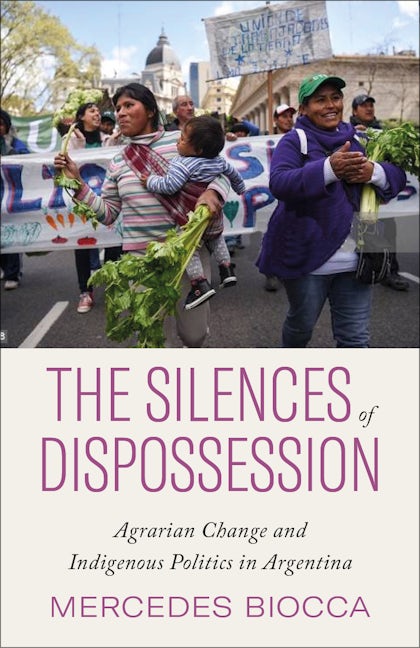
The Silences of Dispossession
Agrarian Change and Indigenous Politics in Argentina
An insightful case study about the effects of capitalism on the indigenous experience in northern Argentina
This book explores omissions, or silences, in previous investigations of agrarian transformations by foregrounding indigenous experiences of capitalist development. Providing a rich and detailed ethnographic study, Mercedes Biocca shows how capitalist processes are perceived, experienced, and either confronted or accepted depending on the different ways in which dispossession, resistance and negotiation have become embedded in the collective local memory.
Challenging accounts that efface the agency of subalterns in shaping rural dynamics, and ignore the diversity of perspectives within indigenous groups, Biocca untangles the connections between global, national and local spatial scales in her analysis of accumulation by dispossession.
Using two case studies, the Qom People in Pampa del Indio and the Moqoit people in Las Tolderías, she presents the main transformations that have taken place in the Argentine agricultural sector during the hegemony of post-neoliberalism while centring the perceptions and roles of subalterns within these transformations.
An open access ebook is also available, here.
Mercedes Biocca is a Professor and an Associate Researcher at the Institute of Higher Social Studies (IDAES) in Buenos Aires, Argentina. Her research focuses on rural issues associated with the spread of agribusiness, the different forms of rural existence imposed by the state and the challenges that face indigenous communities in the north of Argentina in the post-neoliberal period.
'Silences of Dispossession offers a timely account of indigenous struggles around soybean expansion in post-neoliberal Argentina. Eloquent and engaging, Biocca confronts colliding responses to agrarian transformations in light of histories and memories of dispossession, resistance, and negotiations with the State.'
- Paola Canova, author of 'Frontier Intimacies: Ayoreo Women and the Sexual Economy of the Paraguayan Chaco' (University of Texas Press, 2020)'In an important contribution to development and peasant studies, Biocca argues that whether rural people resist or acquiesce to dispossession depends on local rationalities. Comparing two groups of Indigenous rural peasants in the Argentine Chaco, she demonstrates the importance of collective memory, previous engagement with capitalist regimes, and aspirations for inclusion.'
- Nancy Postero, Professor of Anthropology at the University of California San Diego'An important contribution to a growing body of research centering Indigenous communities in Argentina'
- 'NACLA'1. Indigenous Peoples, Agribusiness and the Post-Neoliberal State in Argentina
2. Accumulation by Dispossession and the Everyday Life of Indigenous Peoples
3. Living on the Edges of the Periphery
4. Resistance on the Edge: the Case of the Qom People in Pampa del Indio
5. Acquiescence on the edge: the Case of Moqoit People in Las Tolderías
6. The Actually Existing Agency of Subaltern Groups
140mm x 216mm

